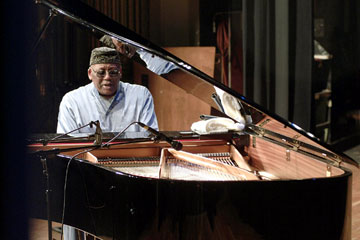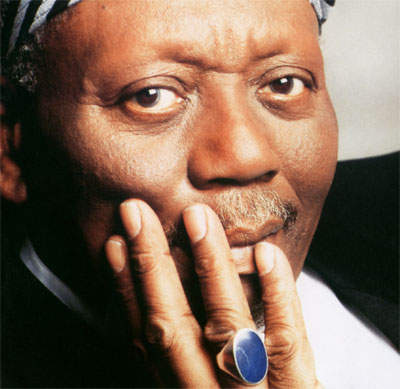
Randy Weston composed his first song for Africa — the ebullient, offhandedly dissonant "Zulu" — in 1954. It marked the embarkation point of a quest: Mr. Weston has spent most of the last half-century promulgating a distinctly African approach to jazz, one shaped by ethnic folk traditions and rooted in spiritual concerns.
Mr. Weston employed "Zulu" as an invocation on Tuesday night at the World Financial Center, teasing out its theme with a chordal rumble and an artfully halting cadence. Alone at the piano, he reached back to a formative influence, Thelonious Monk; one triplet cascade gave off a particular air of homage. In that moment, and in a burst of stride rhythm on the following tune, Mr. Weston offered a glimpse of the jazz pedigree that preceded his African exploration.
That journey began, in a literal sense, at the dawn of the 1960's, when Mr. Weston, who was born and raised in Brooklyn, first visited Lagos, Nigeria. He traveled more widely through the continent in 1967 in behalf of the State Department; by the end of that tour he had decided to relocate. He settled for a while in Tangier, Morocco, where a musician named Abdellah El Gourd brought him into contact with the musical traditions of the Gnawa, an ethnic group descended from Morocco's sub-Saharan slave population.
Mr. Gourd gave a brief synopsis of those traditions on Tuesday night, in careful English. Then he put one of them to use, demonstrating a percussive thumb-strumming technique on the hag'houge, a bass-clef lute with a deep, hypnotic drone. In an aside, Mr. Weston recalled his first impression of the instrument's sound, which reminded him of the Duke Ellington bassist Jimmy Blanton. "I heard the black church, I heard the blues, I heard the music we call jazz," he said.
Those echoes reverberated in an ensuing performance by the Gnawa Master Musicians of Morocco, comprising Mr. Gourd and four additional artists from either Tangier or Marrakesh. Mr. Weston refrained from playing during their first selection, the traditional song "Chalabati," which featured polyrhythmic hand-claps and keening vocals. But he did call up the members of his African Rhythms Quintet, one by one: the bassist Alex Blake, the percussionist Neil Clarke, the multi-reedist T. K. Blue and finally the trombonist Benny Powell.
Mr. Weston has led a version of this ensemble since the early 1990's, and it can be a powder keg. Here, subtle coloration was the focus, especially on "The Shrine," a quintet feature. "Blue Moses," Mr. Weston's adaptation of the Gnawa song "Sidi Musa," better captured the ardor of his Africanized jazz expression; Mr. Blake's bass solo was a gust of strumming and vocalizing that suggested a Moroccan touch.
The Gnawa players offered their own "Sidi Musa," slicing through the thrum of the hag'houge with a metallic din of several karkabas, or hand-held cymbal castanets. Mr. Blue joined their singing with his soprano saxophone; Mr. Powell and Mr. Blake fed the low churn. The overall effect was irrepressibly exuberant, especially as Mr. Blue led his Gnawa brethren on a ramble down from the stage and through the aisles.
The same thing happened on the closing tune, "Lalla Mira," and by then the audience was on its feet. Mr. Weston didn't add to this joyful noise; he merely reveled in it, rocking on his heels with a grin. He wasn't the only one smiling.


Nenhum comentário:
Postar um comentário